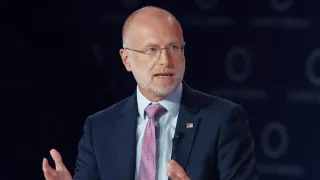December 4, 2018
Parasite Decimates Giant Clam Species in the Mediterranean
Elena Becatoros READ TIME: 1 MIN.
A mysterious microscopic parasite is seeking out and killing a giant species of clam found only in the Mediterranean Sea. Unless scientists can find a way of stopping it soon, they say the mollusk could go extinct.
For thousands of years the noble pen shell has been intrinsically connected to humans. The largest bivalve in the Mediterranean can grow to more than a meter (three feet) long and provided food and one of the world's rarest materials: sea silk, spun from fibers it uses to secure itself to the seabed.
The Pinna nobilis has been a protected species for decades. So the rapid spread of the parasite, which first appeared in the western Mediterranean in late 2016 and was identified just this year as a new species, has alarmed experts.






